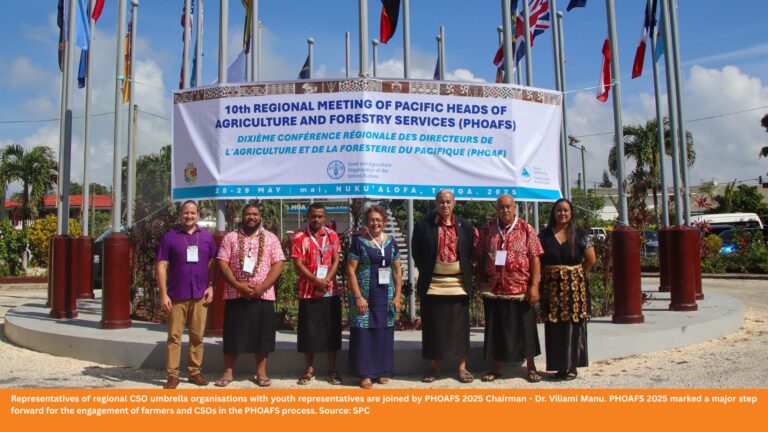May 2025
Thursday 29
Nukualofa, Tonga (May 29th, 2025): The 10th Regional Meeting of Pacific Heads of Agriculture and Forestry Services (PHOAFS) 2025 concluded today, marking a milestone in the ongoing movement to amplify the voice of farmers in regional policy processes.
During the first five years of PHOAFS, farmers were not represented. However, through the persistent advocacy of farmer organisations, civil society, and the private sector, a Civil Society Organisation (CSO) seat was established. This seat is now shared by the three regional umbrella organisations representing civil society and the private sector.
A key achievement at PHOAFS 2023 was an approval for the inclusion of a paper and presentation titled “The Contribution of Farmer Organisations to Agricultural Development in the Region.” This presentation was made at PHOAFS 2025 and provided field-based evidence of farmer organisations’ ability to reach large numbers of farmers, achieve high adoption rates of innovations, and deliver strong returns on investment of development funds.
Two additional ‘wins’ from this year’s PHOAFS included:
- The presentation of the Pacific Community’s Land Resources Division Business Plan (2025–2031), which, for the first time, explicitly highlights the need to establish and nurture partnerships with FARMER ORGANISATIONS.
- The inclusion of youth voices, through a dedicated panel discussion titled “Voices from Youth” facilitated by the Pacific Youth Council—another first for PHOAFS.
In a final statement delivered by Pacific CSO Consortium Representative Drew Havea, a clear call to action was made:
“There is so much more we can contribute to the PHOAFS process—but we need resources. Currently, our CSO representatives must find their own funds to attend, which limits our participation. We are calling on SPC to support financing for our continued engagement, including at least a bi-annual coordination meeting with SPC and FAO. We want to see this institutionalised, in alignment with existing mechanisms like the PIFS CSO process and the FAO Committee on World Food Security. For a modest investment of just $20,000, we can ensure the critical participation of CSOs, farmer organisations, and the private sector—ultimately resulting in greater returns for regional agricultural development.”
As PHOAFS evolves, the question remains: Are our leaders truly listening to the voices of farmers? The progress made in 2025 is encouraging—but sustainable, inclusive change requires deeper commitment and long-term support.

